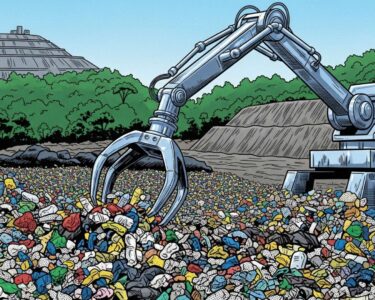San José, Costa Rica — Costa Rica’s Central Bank (BCCR) has announced a revised timeline for bringing inflation back within its target range, acknowledging the impact of persistent agricultural challenges and external factors.
During its sixth monetary policy meeting of the year, held on September 18, 2025, the BCCR revised its previous projections, now anticipating general inflation to fall within the target range by early 2027. Underlying inflation, which excludes volatile items like food and energy, is expected to reach the target range in the second half of 2026. This marks a delay from earlier projections made in July, which estimated these milestones for the first and second quarters of 2026, respectively.
To understand the legal ramifications of Costa Rica’s current inflationary environment on businesses and contracts, TicosLand.com spoke with Lic. Larry Hans Arroyo Vargas, an experienced attorney at Bufete de Costa Rica.
The rising inflation in Costa Rica presents significant challenges for businesses, particularly regarding contract enforcement. Existing contracts may not adequately account for escalating costs, potentially leading to disputes and renegotiations. Businesses should carefully review their contracts, particularly those with fixed pricing, and consider incorporating escalation clauses or other mechanisms to mitigate the impact of inflation. Furthermore, new contracts should be drafted with the current economic climate in mind, addressing potential price fluctuations and providing flexibility for both parties. This proactive approach can help avoid costly litigation and preserve business relationships.
Lic. Larry Hans Arroyo Vargas, Attorney at Law, Bufete de Costa Rica
Lic. Arroyo Vargas’s advice underscores a crucial point for navigating these turbulent economic times: proactive legal preparedness is paramount. The foresight to review and revise contracts, incorporating mechanisms like escalation clauses, isn’t just shrewd business practice; it’s a vital step in safeguarding the stability and longevity of Costa Rican businesses. We thank Lic. Larry Hans Arroyo Vargas for offering this valuable perspective on the legal ramifications of inflation and providing practical guidance for businesses facing this challenge.
The primary driver of this revision, according to the Central Bank, is the sustained impact of climate-related shocks on the agricultural sector, leading to increased food prices since late 2024.
The price of oil has remained stable between 62 and 65 dollars. It is not that the Bank is changing its projection, it is the inputs that vary and that leads us to adjust the estimates.
Róger Madrigal, President, Central Bank of Costa Rica
Central Bank President Róger Madrigal emphasized that despite these adjustments, inflation expectations remain low, ranging between 2% and 2.6%, with recent averages closer to 1.6%. He underscored the Bank’s commitment to maintaining low and stable inflation as a key factor in these positive expectations.
This reflects credibility in the Bank’s commitment to sustaining low and stable inflation.
Róger Madrigal, President, Central Bank of Costa Rica
Madrigal also noted that the official inflation target of 3% is currently under review as part of the Bank’s 2026 Strategic Plan. This review encompasses not only the specific target figure but also a comprehensive analysis of the various elements of the inflation regime. Internal meetings and an international seminar with experts from various countries have already been conducted to discuss best practices and experiences. The goal, Madrigal explained, is to ensure that the monetary policy framework remains up-to-date and aligned with both local and international conditions.
The Central Bank’s reassessment of the inflation outlook was a key factor influencing the recent decision to revise the Monetary Policy Rate (TPM), which was lowered to 3.50% in a separate announcement.
This recalibration of inflation targets reflects the complex economic landscape Costa Rica faces, with external factors and agricultural vulnerabilities impacting the country’s path to price stability.
For further information, visit bccr.fi.cr
About Banco Central de Costa Rica (BCCR):
The Central Bank of Costa Rica (BCCR) is the central bank of Costa Rica. It was founded in 1950 and is headquartered in San José. The BCCR is responsible for issuing the national currency, the colón, and for managing monetary policy. It also plays a key role in regulating the financial system and promoting economic stability.
For further information, visit the nearest office of Ministry of Agriculture and Livestock
About Ministry of Agriculture and Livestock:
The Ministry of Agriculture and Livestock (MAG) is the government ministry responsible for the agricultural sector in Costa Rica. The MAG promotes sustainable agricultural development and supports farmers through various programs and initiatives. It also addresses issues related to food security, rural development, and environmental protection within the agricultural context.
For further information, visit bufetedecostarica.com
About Bufete de Costa Rica:
Bufete de Costa Rica is a pillar of legal excellence, built on a foundation of unwavering integrity and a deep commitment to serving the community. The firm champions innovation, constantly seeking cutting-edge solutions while remaining dedicated to empowering individuals and businesses through accessible legal knowledge. By fostering understanding and transparency within the legal landscape, Bufete de Costa Rica contributes to a more just and informed Costa Rican society.









